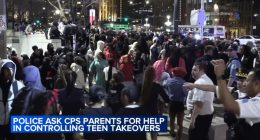
Left: Justice Sonia Sotomayor; Right: Justice Neil Gorsuch (Erin Schaff-Pool/Getty Images)
As Pride Month draws to a close, the Supreme Court’s liberal wing lamented Friday as “a sad day in American constitutional law and in the lives of LGBT people.”
The Court ruled 6-3 in favor of a Christian website designer who said she would refuse to create a wedding website for a gay couple. Justice Neil Gorsuch wrote the majority opinion, while Sonia Sotomayor penned a lengthy dissent in which she was joined by Justices Elena Kagan and Ketanji Brown Jackson.
She began with a sobering statement about what she called “backlash” to strides made in the arena of LGBTQ+ rights (citations omitted):
“What a difference five years makes.” And not just at the Court. Around the country, there has been a backlash to the movement for liberty and equality for gender and sexual minorities. New forms of inclusion have been met with reactionary exclusion. This is heartbreaking. Sadly, it is also familiar. When the civil rights and women’s rights movements sought equality in public life, some public establishments refused. Some even claimed, based on sincere religious beliefs, constitutional rights to discriminate. The brave Justices who once sat on this Court decisively rejected those claims.
Colorado web designer Lorie Smith challenged Colorado’s public accommodation law, which prohibits businesses of public accommodation from refusing to serve patrons because of their sexual orientation. Smith said that she and her company are “generally willing” to serve the LGBT community, but that she “sincerely believes, however, that same-sex marriage conflicts with God’s will.” Notably, Smith had not been asked to create such a website, and her complaint against the state was largely based on a hypothetical situation.
In her dissent, Sotomayor raised numerous examples of how public accommodations laws seek to remedy deeply harmful discrimination. She explained that when a person is refused service due to characteristics such as skin color, religion, or sexual orientation, the consequences are real and troubling.
“This ostracism, this otherness, is among the most distressing feelings that can be felt by our social species,” the justice summarized.
Furthermore, she said, a law like Colorado’s “does not force anyone to start a business, or to hold out the business’s goods or services to the public at large.” Rather, “if a business chooses to profit from the public market,” then “the state may require the business to abide by a legal norm of nondiscrimination.” As a result, the state can ensure that no group is “marked for second-class status.”
Sotomayor reminded the majority of the nation’s history of discrimination against people of color, women, and the disabled. However, she said, as both the scope of “public accommodations” and that of “protected classes” widened, so too did the legal basis for protecting individuals from discrimination in the marketplace.
She summarized the progress that has been made to date:
If you have ever taken advantage of a public business without being denied service because of who you are, then you have come to enjoy the dignity and freedom that this principle protects.
Sotomayor fiercely argued that LGBT people deserve the same “dignity and freedom” that other citizens enjoy, and that laws protecting those rights are simply “the latest chapter of this great American story.”
“LGBT people have existed for all of human history,” noted the justice. “And as sure as they have existed, others have sought to deny their existence, and to exclude them from public life.” The justice then delivered an impassioned recounting of subordination of LGBT people with “backing of law,” the Stonewall protests of 1969, and the murder of Matthew Shepard.
Sotomayor also appeared skeptical about Smith and the sincerity of her claim. The justice called Smith’s choice to challenge Colorado’s law “astounding” in its timing. Despite her company never having sold any websites and never facing any punishment for turning away any gay customers, “Smith now believes, that ‘God is calling her “to explain His true story about marriage.”‘”
The justice was also quick to remind the majority what could happen as a next result of the ruling.
“A website designer could equally refuse to create a wedding website for an interracial couple, for example. How quickly we forget that opposition to interracial marriage was often because ‘Almighty God . . . did not intend for the races to mix,”” Sotomayor wrote, citing the landmark 1967 ruling in the case of Loving v. Virginia, in which a unanimous Supreme Court found that laws prohibiting interracial marriage are unconstitutional.
Justice Neil Gorsuch authored the majority decision in the case — but gone was the Gorsuch of 2020 who wrote that “it is impossible to discriminate against a person for being homosexual or transgender without discriminating against that individual based on sex.”
Read Related Also: U.S. Marine Among 2 Accused Of Firebombing Planned Parenthood Clinic
Rather, Gorsuch reduced this case to the simplest of First Amendment matters. The Constitution, he said, “protects an individual’s right to speak his mind regardless of whether the government considers his speech sensible and well intentioned or deeply ‘misguided.’”
“[T]he government cannot compel a person to speak its own preferred messages,” Gorsuch added.
Gorsuch minimized Smith’s views on gay marriage as those that simply may “not be popular in all quarters,” and said that Colorado cannot legally demand that Smith use her voice to say what she doesn’t want to say.
Gorsuch warned that to rule as the dissent suggests could potentially “force an unwilling Muslim movie director to make a film with a Zionist message” or “an atheist muralist to accept a commission celebrating Evangelical zeal” — or even a gay website designer to create websites for a homophobic organization.
Gorsuch insisted that despite the ruling, public accommodations laws that prohibit discrimination remain important, and LGBTQ citizens can still be protected in other ways. Gorsuch suggested that states can choose to protect classes of people with laws that entitle them to “acquir[e] whatever products and services they choose” from “a vast array of businesses” on the same footing as the rest of the public — just so long as those transactions do not impinge on free speech.
He went on to characterize the Court’s ruling as one that is absolutely necessary to protect free speech:
Were the rule otherwise, the better the artist, the finer the writer, the more unique his talent, the more easily his voice could be conscripted to disseminate the government’s preferred messages. That would not respect the First Amendment; more nearly, it would spell its demise.
Responding to Sotomayor’s dissent, Gorsuch said that it “makes [no] difference” that Smith was running a for-profit business in which she was paid for her web design.
“Does anyone think a speechwriter loses his First Amendment right to choose for whom he works if he accepts money in return? Or that a visual artist who accepts commissions from the public does the same?” asked Gorsuch rhetorically before pointing out that “Many of the world’s great works of literature and art” were created for profit.
Gorsuch was overtly dismissive of most of the dissent’s points, noting that, to him, “[i]t is difficult to read the dissent and conclude we are looking at the same case.” The justice said that while there is “much to applaud” about the advances in gay rights, none of that is relevant to Smith’s case.
Gorsuch, several times, accused the dissenters of “reimagining” the facts of Smith’s case, then chastised his fellow justices for spending time “adrift on a sea of hypotheticals about photographers, stationers, and others” that simply do not matter to the ruling.
Gorsuch reprimanded the dissenting trio for failing to see the danger in permitting states to demand that vendors such as Smith abide by public accommodation laws:
Perhaps the dissent finds these possibilities untroubling because it trusts state governments to coerce only “enlightened” speech. But if that is the calculation, it is a dangerous one indeed.
Gorsuch defended the ruling by analogizing to a 1977 landmark ruling in which the Court protected the right of Nazis to march through a town inhabited by Holocaust survivors: “A commitment to speech for only some messages and some persons is no commitment at all.”
Sotomayor, though, had a different take on the ruling’s significance. She called out her fellow justices for the “unattractive lesson” their ruling teaches: “What’s mine is mine, and what’s yours is yours.”
Public accommodation laws exist, Sotomayor said, because in a “free and democratic society, there can be no social castes” — and that must be true in the “public market” as well.
“For the ‘promise of freedom’ is an empty one if the Government is ‘powerless to assure that a dollar in the hands of [one person] will purchase the same thing as a dollar in the hands of a[nother],’” the justice wrote in closing. “Because the Court today retreats from that promise, I dissent.”
Have a tip we should know? [email protected]








